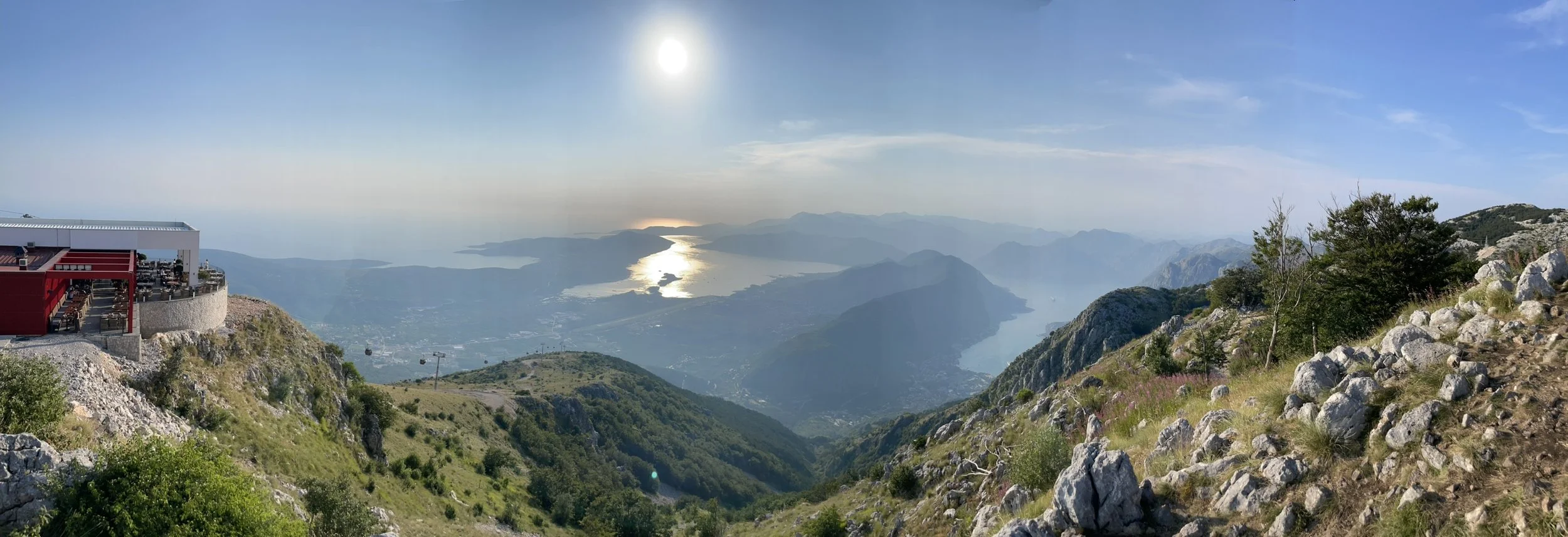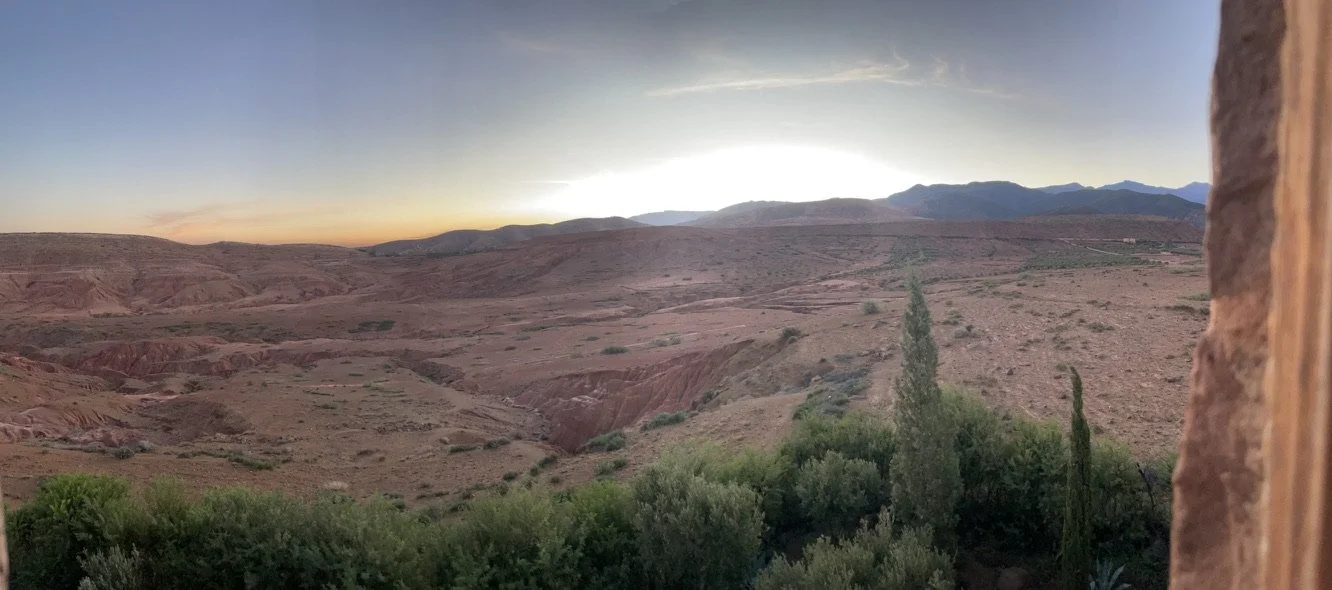Reflections and Recommendations Six Months In
Sunset over Tuscany, Italy
I have been in a phase of this experiment in which I am trying to be more present and aware of where I am, what I am experiencing and just how grateful I am to have this opportunity. It has made me pretty introspective and I am finding that the simple act of taking a moment everyday to really soak in the world around me is one of the best ways to refresh and feel inspired. It has me reflecting on these past six months (How has it gone by so quickly?!?). What have I learned and would I do somethings differently, especially as it relates to The Long Commute project?
Inside the Hagia Sofia in Istanbul, Turkey
The truth is that things have not worked out the way I had initially envisioned in my head. When I started this project, I had grand visions of interacting with as many people as I could, talking about their lives, their work and their culture. A lot of these interactions and connections have happened and, please don’t get me wrong, absolutely every culture we have come across along the way have been overwhelmingly welcoming and hospitable. However, most people just want to go about their day, without having to play 21 questions about their personal lives with a stranger.
I get it. Especially as an introvert, if this were me, I would smile and try to move on without being rude.
That said, it doesn’t deter me from pushing forward. As I said in my very first post, I fully imagined that this would evolve and change shapes along the way. With each day comes new challenges, new personal growth and learning about the world. I always want to ground my thinking in my guiding principles of curiosity, connection, community and culture. With these in mind, I have been finding myself more and more curious about this whole concept of “career breaks” or sabbaticals. I know why I am on my sabbatical, but who else is taking them and why? How do they spend their time during the career break, and what challenges do they face along the way? How does this differ from my experience and what can I learn from them?
Further, as I spoke about briefly in the “I’m a Quitter” post, there are communities dedicated to people who are traveling while on career breaks and/or as digital nomads. How does one get involved in these communities and what are the cultural dynamics that have been adopted considering each one’s unique circumstances?
I have been spending more and more time exploring these personal and interpersonal dynamics. Selfishly, I want to learn about my new “tribe” and become more involved in these communities, but perhaps it will also help inspire you to do something different. Maybe it will demystify the whole concept and demonstrate how it’s not as scary as it sounds to take a leap of faith with the proper tools and planning.
I think the first thing to understand is that this doesn’t have to be an around the world sabbatical. It can be as simple as an extended vacation, taking more personal days or just finding ways to have a mental escape within the situation you are in.
Bay of Kotor, Montenegro
Which brings me to the real “reflections and recommendations” hinted at in the title of this post - If almost 20 years of experience developing people to help them grow in their careers, being a career coach and a career management expert has taught me nothing else, mental health and confidence are critical to making a career change, large or small. Choosing to be a digital nomad and taking an travel sabbatical is no different, and both options present unexpected challenges to one’s mental well being that may not have been experienced or coped with in a traditional role.
For me, one of the most unanticipated challenges I have encountered thus far has been a feeling of isolation that comes with this lifestyle. In a traditional role, you have a built in social circle with your local friends and co-workers (like it or not) that you see on a day to day basis. On a sabbatical, this no longer exists, and as a digital nomad your in person interactions for work are few and far between. I have been thinking a lot about how this isolation has impacted my own mental health, even as an introvert. At the end of the day, I am a human and humans are social creatures. We all need some social stimulation to varying degrees.
You know me, I have done some research, especially reading and listening to people who have been through it. The comforting thing that I have found is that this feeling is quite common among people on sabbatical, but how do we cope with it?
Santorini, Greece
Here are a few recommendations:
Stay connected with your support base - Making new friends should absolutely be part of your journey, but we all have the support base of people whom we have built long-term relationships with. The people we know we can call up just about any time of the day or night to vent and share what we are feeling. Build these connection points into your routines and as part of your travel plans. For example:
Coordinate stops along the way with the travel plans of friends and family.
Set up regular video calls with friends and family.
Make socializing part of your routine - Humans are creatures of habit by nature. Just like scheduling time for your work, physical activities, and so on it is important to make time to socialize. This serves a couple of purposes:
When you were back “home,” you probably scheduled time with your friends and family to go out, have dinner, a few drinks and just unwind or share how your week was going. This is no different. Make that same effort for yourself while on extended travel.
If nothing else, it makes sure those of us who might be a little less into going to the gym and work from home get out of the house!
Find local communities with similar interests (this one is a bit tougher if time from place to place is brief). Just like back “home,” join the local adult sports league of your liking. Find book clubs or wine tasting groups. Take one off courses, like a cooking class.
Join online communities for people on career breaks, digital nomads, etc.
I have mentioned this group before, but it really is a great resource, so I will share again links to The Sabbatical Project groups on Facebook.
There is also a great podcast that we have been listening to called Sabbatical Stories. While this is not a community, many of the guests on the podcast have an online presence and groups that you can follow and interact with.
Look for “Co-Working” opportunities where you can live/work with others on a similar journey - This may not be for everyone. I know I am a bit too set in my ways to want to share living spaces and bathrooms with people other than my wife for more than a few days. But I am nonetheless intrigued and inspired by these co-working communities. Here are a few that I have recently followed for ideas on how to better live this lifestyle, how to find a good balance of work and play, and much more.
If you are traveling with someone, check in with how they are feeling regularly - Isolation does not necessarily mean that you are alone. As I have shared, I am on this adventure with my wife. While we are making friends and even meeting up with friends in amazing places, we spend most of our days just the two of us. Don’t get me wrong, we are great partners, travel buddies and our marriage couldn’t be stronger, but for me, it has been the disconnection from our support base and many of the routines/creature comforts that I was so used to. Part of this is finding new routines, but your partner/travel buddy may be experiencing something different than you. Make time to check in from time to time to see how each other are feeling. What is going well for them? What do they need more of? The act of asking these simple questions goes a long way to cope.
Sunrise in the Atlas Mountains in Morocco
Find a coach specializing in career breaks and digital nomads - I have been researching professionals who provide these sorts of services. They certainly are not your psychologist, but most have been where you are now, especially while out traveling the world. They can help with coping mechanisms, as well as a whole heap of other services ranging from remote work strategies (i.e., how to get a remote role and then how to manage your travel once you are in it), to budgeting, to visas, and much more.
On this last bullet point, please do not hesitate to reach out to me! I might not have all the answers, but I can be someone who has been there, will listen and help you explore what solutions might be right for you and your situation.





